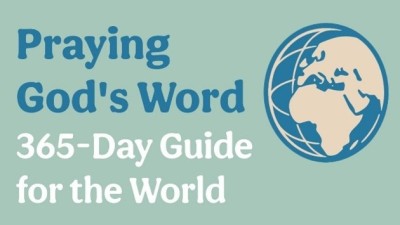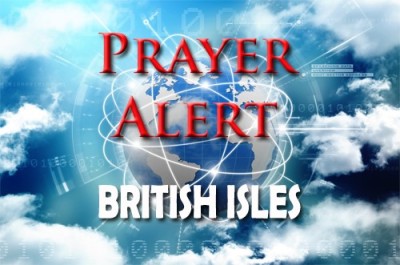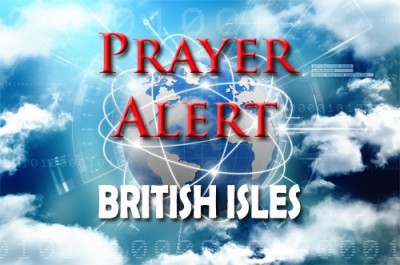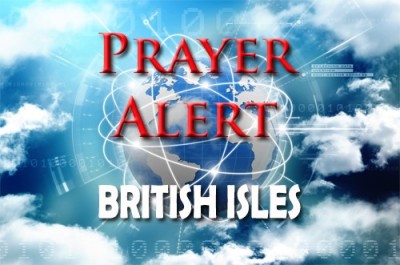As we enter a new year of Kingdom opportunity, we are grateful for your faithful partnership in prayer. Your intercession continues to strengthen the global Body of Christ and advance the Gospel in places where Jesus is least known.
Today, we’re inviting you to join a powerful new initiative launching January 1 in partnership with The Bible App (YouVersion):
Praying God’s Word: 365-Day Guide for the World.
This yearlong plan leads us in daily Scripture-based intercession for 365 frontline workers serving in 110 gateway cities across the least-reached regions of the world.
Each day includes God’s Word, the name of a specific worker or team, and a simple prayer to pray on their behalf. It grants us the privilege of standing with them as they share the Gospel, translate God's Word, plant churches, make disciples, and minister to the poor and broken.
This is a beautiful convergence of prayer, missions, and God’s Word, and we believe the impact will be significant as thousands join together in daily prayer.
Register here to begin the 365-day plan:
https://www.bible.com/reading-plans/64200-365-prayers-to-change-the-world
Or use this QR code:

Thank you for standing with us and lifting up Jesus among the nations. We are deeply grateful for your prayerful partnership.
Christmas churchgoing: nearly half of Brits plan to attend
A new poll commissioned by Tearfund suggests a significant rise in Christmas church attendance across the UK, with nearly half of adults planning to attend a service or church event this year. The survey of two thousand adults found that 45% intended to go to church at Christmas, up from 40% last year, with Gen Z leading the trend. Six in ten young adults said they planned to attend, pointing to a growing openness to faith and community in their age group. Notably, attendance intentions among non-Christians also increased, with many reporting that church left them feeling joyful, peaceful, and hopeful. Tradition, atmosphere, and spiritual reflection were key motivations, while the poll also highlighted the vital practical role churches play. 42% of respondents said they or someone they knew had received support such as foodbanks, warm spaces, or free meals from a church over Christmas. Tearfund reports similar patterns in other countries: in the Central African Republic, Christmas gatherings draw entire communities together around worship, food, and hope. Churches continue serving faithfully long after the season ends.
Keir Starmer: how the Church represents 'true Britain'
In an interview with Premier Christian News, Keir Starmer has spoken warmly about the importance of Christian values and the vital role churches play across the UK. Speaking after a Downing Street reception honouring about a hundred church volunteers, Starmer described faith as a 'north star' during times of insecurity, conflict, and economic pressure. He highlighted Christian values of compassion, dignity, and care for others as essential foundations in a divided world. Starmer praised church volunteers as representing 'the true Britain' - a nation marked by kindness, generosity, and a willingness to look out for one another. He warned that these qualities are increasingly challenged by voices seeking to divide society, and said the Church’s quiet, faithful service tells a powerful story about national identity. From food provision to companionship and community support, he noted that churches step in where government cannot always reach. He also pledged closer partnership between government and churches, emphasising that this service continues year-round, not just at Christmas. Looking ahead to Christmas Day, Starmer said he plans to attend church with his family, welcoming a season of reflection, peace, and gratitude.
Bank of England expected to cut interest rates
The Bank of England is widely expected to cut interest rates, reducing the Bank rate from 4% to 3.75% - its lowest level since February 2023. Analysts anticipate a close vote among the nine-member Monetary Policy Committee, with some members still cautious about easing policy too quickly. If agreed, it would be the sixth rate cut since August last year, reflecting growing confidence that inflationary pressures are easing. New data from the Office for National Statistics show inflation falling more sharply than expected, from 3.6% in October to 3.2% in November. Although inflation remains above the Bank’s 2% target, signs of rising unemployment and a sluggish economy are increasing pressure for action. Economists suggest cooling price pressures now outweigh previous concerns about cutting too soon. Lower interest rates are expected to bring modest relief to homeowners on tracker or variable-rate mortgages, with small monthly reductions in repayments. However, savers are likely to see reduced returns, as easy-access savings rates continue to decline. The decision highlights the delicate balance between easing household pressures and safeguarding long-term economic stability.
We need more people ready to fight, military chief says
Chief of the Defence Staff, Air Chief Marshal Sir Richard Knighton, has warned that the nation needs more people prepared to defend the country amid growing global instability and rising threats from Russia. He called for a 'whole-of-society response' to deter conflict, stressing the importance of strengthening regular forces, reserves, cadets, and the defence workforce. While he said the likelihood of a direct Russian attack on the UK remains remote, he highlighted intensifying hybrid threats, including cyber-attacks, suspected sabotage, and hostile surveillance near UK waters. He described Russia’s military as increasingly sophisticated, combat-experienced, and expanding in hard power, despite setbacks in Ukraine. The UK, he said, must become a 'harder target' to avoid war rather than provoke it. Building national resilience, he argued, goes beyond military strength and includes universities, industry, energy, healthcare, and manufacturing. With defence spending set to rise sharply, he emphasised the need to inspire young people to pursue careers supporting national security. Recent investments include £50 million for new defence technical colleges to address critical skills gaps.
Nine-year-old girl murdered in Weston-super-Mare
Weston-super-Mare is in deep shock following the tragic death of nine-year-old Aria Thorpe, who was fatally stabbed at her home on 15 December. The police confirmed that she died at the scene after suffering a single stab wound. Emergency services were called, but despite their efforts, she could not be saved. Police have now released two photographs, which reflect a joyful, much-loved child, whose loss has devastated family, friends, and neighbours. A 15-year-old boy has been charged with Aria’s murder and has been remanded into youth detention pending further court proceedings. Specialist police officers continue to support Aria’s family, while schools and local agencies are providing care for those affected by this traumatic event. The family has asked for privacy as investigations continue. See






